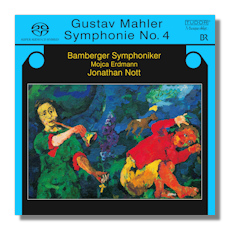
The Internet's Premier Classical Music Source
Related Links
- Mahler Reviews
- Latest Reviews
- More Reviews
-
By Composer
-
Collections
DVD & Blu-ray
Books
Concert Reviews
Articles/Interviews
Software
Audio
Search Amazon
Recommended Links
Site News
 SACD Review
SACD Review
Gustav Mahler

Symphony #4 in G Major
Mojca Erdmann, soprano
Bamberg Symphony Orchestra/Jonathan Nott
Tudor 7151 55m Hybrid Multichannel SACD
Their discography is not (yet) large. Nevertheless, conductor Jonathan Nott and the Bamberg Symphony have made their mark with several particularly fine recordings, including two (a Mahler First and a Schubert Ninth) that were awarded "Editor's Choice" status by Gramophone. This one is another winner, and certainly a top choice among recent recordings, although it won't necessarily replace (name your own favorite here) from the pre-digital era. The orchestral playing, while not always the smoothest, has a likeable personality. Even on a conventional CD player, this SACD sounds gorgeous.
Although the first movement is often meltingly phrased, Nott favors an overall mood here which is not as mellow as in many other recordings. The subtly grotesque and dangerous are seldom far away. Strong contrasts are favored, and tempo shifts are underlined. When the movement reaches its climax, it is strong and confident. Nott requires 16:08 in this movement, which is 77 seconds faster than Previn/Pittsburgh, one of my current favorites from yesteryear.
Peter Rosenberg's scordatura violin is not especially ghostly early in the second movement, although it becomes more pointed later. Fairly quick tempos mean that the music loses some of its sinister elegance and becomes more countrified. The playing is well characterized though. The engineering spotlights the stabbing violin pizzicatos, which is effective but not realistic.
Nott makes the third movement into a varied, dramatic, and sometimes perilous journey to the precincts of Paradise. By the time it reaches its final resting point, it sounds as if the music has been through many trials.
Thanks to Mojca Erdmann's lovely singing, the fourth movement is very pleasurable. She has a boyish timbre. Her delivery is sophisticated, though – this is one of those times when a little more naïveté and simple joy would have been a good thing.
The booklet note can be summarized by its final sentence, "For you cannot entirely trust heavenly life." As if it felt bad about this ambiguous message, Tudor adds another paragraph advising listeners to make up their own minds! The German text in the final movement is given a (nearly) rhyming English translation, but it is awkward, and even reduces the number of heaven's young virgins to ten thousand from eleven! Blame it on the global economic recession?
Copyright © 2009, Raymond Tuttle





















